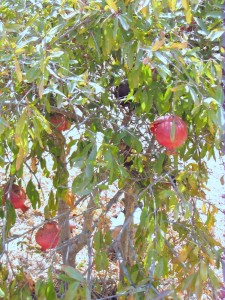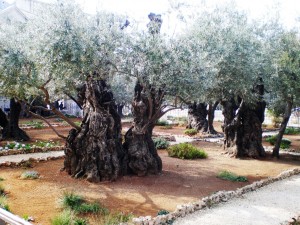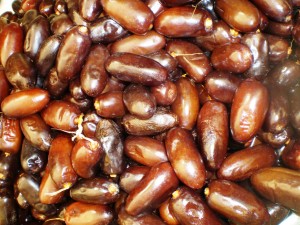In recent years much has been said about the health benefits of a Mediterranean diet. We tend to think of this as a modern discovery, but in fact the ancient Israelites knew this long ago. The bible relates in Deuteronomy 8:8 how they were lucky enough to inherit a land “of wheat and barley, of vines, figs and pomegranates, a land of olive trees and honey” and how they were instructed by G-d not to forget His divine part in the bounty of the land and to give appropriate thanks. We are also told, three chapters later, that the amount of rainfall we receive will be in direct accordance with our merit in the eyes of G-d.
As the heat of the long summer is dissipating and we begin the gradual slide into autumn, there is not a huge variety of fruit to be had locally, but this is the season for much of the seven species to ripen. In tandem, we also begin mentioning the phrase “He who makes the wind blow and causes the rain to descend”, in the daily Amidah prayer said three times a day.
The grape harvest has just finished and local wineries are hard at work creating this year’s vintage. Grapes used for making wine and those for eating as fruit are very different varieties. The wine grapes are much smaller with thicker skins and seeds, whilst those we like to put in our fruit bowls are plumper and sweeter. The grape and its products of wine, raisins and vinegar are mentioned more than any other fruit in the bible. In Numbers 13:23, we learn that the scouts sent by Moses to appraise the land cut down a cluster of grapes that was so heavy it required two people to carry it. The Israeli ministry of tourism was so taken with this image that it chose it as its emblem.  So if ancient Israel was so full of grapes where are they all today? The reason for their disappearance can be traced to the era when the Moslems ruled over the land. Alcohol is forbidden in Islam and so most of the varieties of grape were uprooted to prevent the people from making wine.
So if ancient Israel was so full of grapes where are they all today? The reason for their disappearance can be traced to the era when the Moslems ruled over the land. Alcohol is forbidden in Islam and so most of the varieties of grape were uprooted to prevent the people from making wine.
Today, the health benefits of grapes and wine are becoming better known. Grapes contain vitamins A, B and C, they also fight tooth decay, halt several viruses and are imbued with many other properties that researchers believe may ward off cancer. Moderate wine consumption also appears to prevent heart disease. In ancient times grapes were mixed with myrrh and used for medicinal purposes as a form of anesthetic on the battlefield, for surgical operations and during childbirth.
Plump and purple figs are appearing in the stores, and these were a well known form of food in biblical times, apparently a favourite of King David. We hear in the book of Samuel 1 25:18 how he is provided with fig cakes by Avigail, who later becomes his wife, and, in turn, how he feeds others with this nutritional delicacy (Samuel 1 30:12 and Chronicles 1 12:41). Perhaps they were a food item that travelled well, as King David was forever on the move and the healthy fig cake was easy to carry. We also learn about its medicinal properties in the book of Isaiah (38:21) when the prophet administers fig cake to the dying King Hezekiah, who recovers to live another fifteen years. Today, figs are known to have tremendous health benefits from being a concentrated source of energy, to warding off high blood pressure and diabetes.
Succulent red pomegranates are hanging from two trees in my garden and are in plentiful supply all over the country.  Traditionally, the fruit is a symbol of righteousness because it is said to have 613 seeds corresponding to the number of the commandments in the Torah. In Israel, we eat pomegranate on Rosh Hashana as one of the new fruits, with the hope it will be a portent of a good new year. In ancient times it was considered representative of abundance and fertility and was given a place of honour in biblical art. In the description of Solomon’s temple in Kings 1 we hear how the pillars of Boaz and Yachin, which stood at the entrance, were adorned with two rows of pomegranates. They are also mentioned as part of the clothing of the high priest (Exodus 28:33-34). Pomegranates are known for their healthy attributes due to the large number of anti-oxidants packed into the fruit, benefits range from preventing arthritis to curing erectile dysfunction!
Traditionally, the fruit is a symbol of righteousness because it is said to have 613 seeds corresponding to the number of the commandments in the Torah. In Israel, we eat pomegranate on Rosh Hashana as one of the new fruits, with the hope it will be a portent of a good new year. In ancient times it was considered representative of abundance and fertility and was given a place of honour in biblical art. In the description of Solomon’s temple in Kings 1 we hear how the pillars of Boaz and Yachin, which stood at the entrance, were adorned with two rows of pomegranates. They are also mentioned as part of the clothing of the high priest (Exodus 28:33-34). Pomegranates are known for their healthy attributes due to the large number of anti-oxidants packed into the fruit, benefits range from preventing arthritis to curing erectile dysfunction!
 Olives are another ingredient that was a mainstay of ancient biblical cuisine. The number of olive presses that have been discovered in the country suggests that olive oil was widely produced in ancient times. In fact correspondence shows we even used to export it to Egypt and Mesopotamia! King Hiram of Tyre, who sent his carpenters and masons to build the palaces of David and Solomon and the temple in Jerusalem, was partially paid in olive oil (Kings 1 5:25). The oil was probably originally used for medicinal purposes as a skin lubricant for cracks and sunburn. Later it was used in cooking where it took the place of butter or animal fat. We know it was also an ingredient in the temple sacrifices, used for oil lamps where it gave a very bright flame, and used for anointing kings. The translation of “messiah” literally means “anointed one”. Olives were one of ancient Israel’s most important natural resources. Interestingly enough, although olive oil was pressed from very early on, soaking and fermenting the fruit was a process only begun in Roman times. Today, olive oil has become popular amongst the health conscious due to its high level of unsaturated fatty acids.Israel produces a wide range of quality olive oils, but due to competition from heavily subsidized European imports, the continuation of the olive oil industry in this country is being severely threatened.
Olives are another ingredient that was a mainstay of ancient biblical cuisine. The number of olive presses that have been discovered in the country suggests that olive oil was widely produced in ancient times. In fact correspondence shows we even used to export it to Egypt and Mesopotamia! King Hiram of Tyre, who sent his carpenters and masons to build the palaces of David and Solomon and the temple in Jerusalem, was partially paid in olive oil (Kings 1 5:25). The oil was probably originally used for medicinal purposes as a skin lubricant for cracks and sunburn. Later it was used in cooking where it took the place of butter or animal fat. We know it was also an ingredient in the temple sacrifices, used for oil lamps where it gave a very bright flame, and used for anointing kings. The translation of “messiah” literally means “anointed one”. Olives were one of ancient Israel’s most important natural resources. Interestingly enough, although olive oil was pressed from very early on, soaking and fermenting the fruit was a process only begun in Roman times. Today, olive oil has become popular amongst the health conscious due to its high level of unsaturated fatty acids.Israel produces a wide range of quality olive oils, but due to competition from heavily subsidized European imports, the continuation of the olive oil industry in this country is being severely threatened.
 Dates are another food which were of very high quality in the Land of Israel. The many references to “the land of milk and honey” in the bible refer to date honey; the fruit was often boiled into thick syrup used as a sweetener. In Deuteronomy 34:3 where Moses is afforded a view of the Promised Land before he dies, he looks over from Mount Nebo to the “Valley of Jericho, the city of palm trees”. The palms in question are date palms. However, dates need to be nurtured and irrigated and, as different rulers conquered the land and failed to take care of the dates, they withered and died. It was only after the creation of the state in 1948 that Israel’s date industry was kick started once more with shoots imported from abroad. Date trees were very economical, as every part could be used: the branches for the basket and mat industry, the leaves for building the roof or wall of a succa, the fibre stems for making rope and the lower stems for a broom. There are several different strains of dates grown in modern day Israel including the ‘madjhoul’ dates which are soft, brown and sweet and the yellow ‘barhi’ dates which are eaten whilst still crunchy. One of the most interesting date strains to be grown here is still in its infancy, although it goes by the name of Methuselah, the oldest person mentioned in the bible. The date seeds are actually 2000 years old, and were discovered in the 1960s during archeological excavations at Masada. They weren’t planted until 2005, but according to carbon dating were probably originally from the era of King Herod the Great, when he renovated Masada in the first century BCE. They are a variety called ‘Judean Date’. According to the Roman author, Pliny the Elder, these dates were said to have medicinal properties, used against “spitting blood” (probably meaning tuberculosis) and stomach problems, including diarrhea. Sarah Sallon, the project manager who runs a natural medicine research centre at Jerusalem’s Hadassah hospital, hopes to study those medicinal properties. Methuselah is currently sprouting at the Arava Institute for Environmental Studies on Kibbutz Ketura.
Dates are another food which were of very high quality in the Land of Israel. The many references to “the land of milk and honey” in the bible refer to date honey; the fruit was often boiled into thick syrup used as a sweetener. In Deuteronomy 34:3 where Moses is afforded a view of the Promised Land before he dies, he looks over from Mount Nebo to the “Valley of Jericho, the city of palm trees”. The palms in question are date palms. However, dates need to be nurtured and irrigated and, as different rulers conquered the land and failed to take care of the dates, they withered and died. It was only after the creation of the state in 1948 that Israel’s date industry was kick started once more with shoots imported from abroad. Date trees were very economical, as every part could be used: the branches for the basket and mat industry, the leaves for building the roof or wall of a succa, the fibre stems for making rope and the lower stems for a broom. There are several different strains of dates grown in modern day Israel including the ‘madjhoul’ dates which are soft, brown and sweet and the yellow ‘barhi’ dates which are eaten whilst still crunchy. One of the most interesting date strains to be grown here is still in its infancy, although it goes by the name of Methuselah, the oldest person mentioned in the bible. The date seeds are actually 2000 years old, and were discovered in the 1960s during archeological excavations at Masada. They weren’t planted until 2005, but according to carbon dating were probably originally from the era of King Herod the Great, when he renovated Masada in the first century BCE. They are a variety called ‘Judean Date’. According to the Roman author, Pliny the Elder, these dates were said to have medicinal properties, used against “spitting blood” (probably meaning tuberculosis) and stomach problems, including diarrhea. Sarah Sallon, the project manager who runs a natural medicine research centre at Jerusalem’s Hadassah hospital, hopes to study those medicinal properties. Methuselah is currently sprouting at the Arava Institute for Environmental Studies on Kibbutz Ketura.
If this blog about food in the Land of Israel has whetted your appetite, in December I shall be leading a boutique kosher gourmet tour of some of the best food and wine Israel has to offer. The one day tour will be limited to 20 participants. If you would be interested in receiving details please send me an email. Scheduled dates for the tour are Sunday December 16th (last day Chanukah) and Sunday December 30th.
